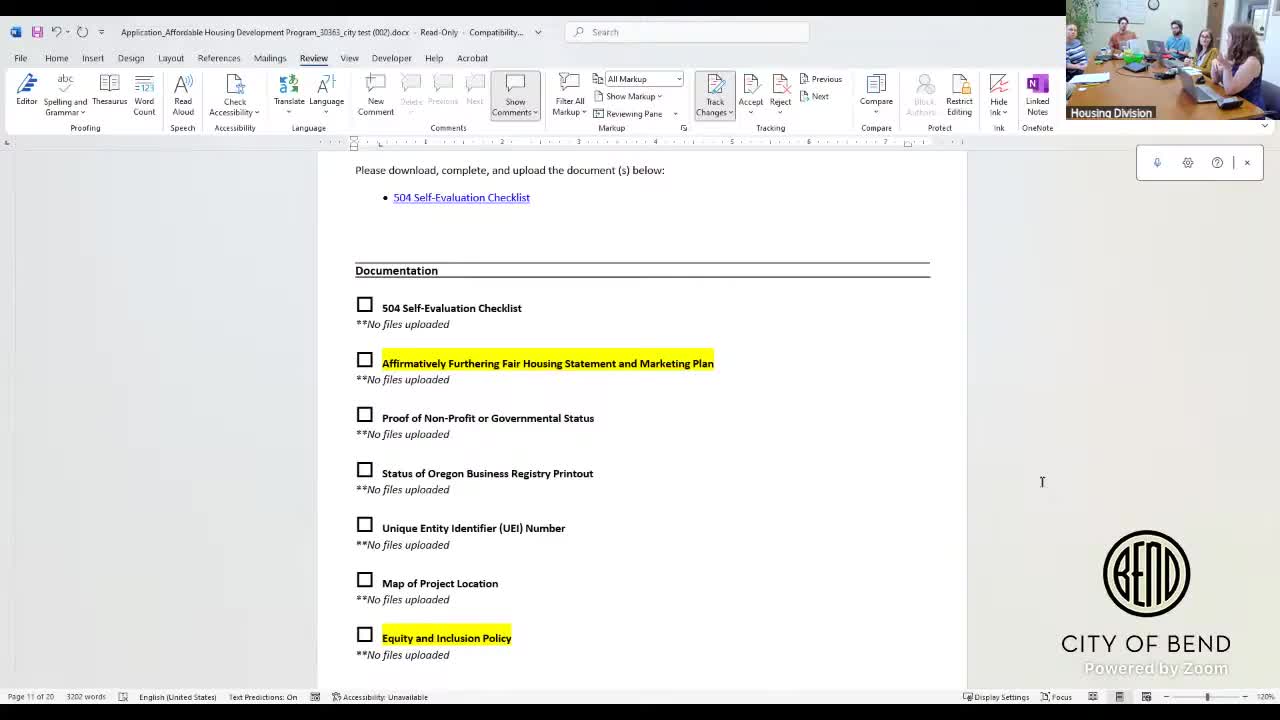Panel Discusses State Funding Requirements for Equity and Inclusion Policies
September 30, 2025 | Bend, Deschutes County, Oregon
This article was created by AI summarizing key points discussed. AI makes mistakes, so for full details and context, please refer to the video of the full meeting. Please report any errors so we can fix them. Report an error »

In the heart of Bend, Oregon, city officials gathered for a pivotal meeting of the Affordable Housing Advisory Committee's Application Review Subgroup. The atmosphere buzzed with urgency as members discussed the critical intersection of state funding and fair housing requirements, a topic that resonates deeply within the community.
As the meeting unfolded, a key point emerged: the state holds a more robust authority to enforce fair housing policies than federal regulations. This distinction is crucial for organizations seeking funding, as it sets a higher standard for compliance. One committee member emphasized the necessity of certain documents, suggesting that regardless of federal or state guidelines, applicants should be prepared to meet these expectations. "If you're using state funding, we're gonna wanna see these things as well," they stated, highlighting the importance of transparency and accountability in the application process.
The conversation turned to the equity and inclusion policy, which sparked a debate about its applicability to various types of applicants. While nonprofit organizations may find it easier to align with these policies, for-profit developers also vie for funding. This complexity led to a proposal to refine the language of the application requirements, ensuring clarity on when the equity and inclusion policy would be mandatory. "Maybe we should just align the language with what the state requires," suggested one member, advocating for a streamlined approach that accommodates both state and federal funding scenarios.
As discussions progressed, the committee recognized the need for flexibility. They considered allowing the equity and inclusion policy to be a requirement only for those projects already secured with state funding, while leaving room for adjustments based on the funding status at the time of application. This nuanced approach aims to balance the need for inclusivity with the realities of diverse funding sources.
The meeting concluded with a sense of purpose, as committee members understood the implications of their decisions on the future of affordable housing in Bend. By navigating the complexities of funding requirements and fostering equitable practices, they are laying the groundwork for a more inclusive community. As the city moves forward, the outcomes of these discussions will undoubtedly shape the landscape of affordable housing, ensuring that it meets the needs of all residents.
As the meeting unfolded, a key point emerged: the state holds a more robust authority to enforce fair housing policies than federal regulations. This distinction is crucial for organizations seeking funding, as it sets a higher standard for compliance. One committee member emphasized the necessity of certain documents, suggesting that regardless of federal or state guidelines, applicants should be prepared to meet these expectations. "If you're using state funding, we're gonna wanna see these things as well," they stated, highlighting the importance of transparency and accountability in the application process.
The conversation turned to the equity and inclusion policy, which sparked a debate about its applicability to various types of applicants. While nonprofit organizations may find it easier to align with these policies, for-profit developers also vie for funding. This complexity led to a proposal to refine the language of the application requirements, ensuring clarity on when the equity and inclusion policy would be mandatory. "Maybe we should just align the language with what the state requires," suggested one member, advocating for a streamlined approach that accommodates both state and federal funding scenarios.
As discussions progressed, the committee recognized the need for flexibility. They considered allowing the equity and inclusion policy to be a requirement only for those projects already secured with state funding, while leaving room for adjustments based on the funding status at the time of application. This nuanced approach aims to balance the need for inclusivity with the realities of diverse funding sources.
The meeting concluded with a sense of purpose, as committee members understood the implications of their decisions on the future of affordable housing in Bend. By navigating the complexities of funding requirements and fostering equitable practices, they are laying the groundwork for a more inclusive community. As the city moves forward, the outcomes of these discussions will undoubtedly shape the landscape of affordable housing, ensuring that it meets the needs of all residents.
View full meeting
This article is based on a recent meeting—watch the full video and explore the complete transcript for deeper insights into the discussion.
View full meeting
